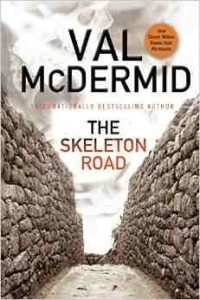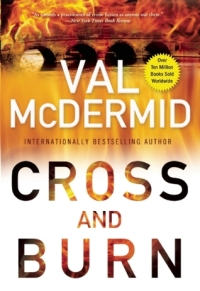The Skeleton Road by Val McDermid
 Friday, January 16, 2015 at 6:52AM
Friday, January 16, 2015 at 6:52AM 
First published in the UK by Little, Brown in 2014; published by Atlantic Monthly Press on December 2, 2014
I tend to like Val McDermid's plots while disliking her characters. That pattern held true with The Skeleton Road, which is either a stand-alone novel or (more likely) the first in a series.
As has become common in a certain kind of crime novel, DCI Karen Pirie is quick to tell everyone that she cares about crime victims and their grieving families more than anyone else in the police, or possibly the world. Pirie is a self-righteous, judgmental, self-important bully, which makes her a realistic police detective but an annoying character. Pirie is a clone of Paula McIntyre from McDermid's Tony Hill/Carol Jordan series, another character I find it difficult to stomach. Fortunately, while Pirie's personality never improves, it becomes more tolerable late in the novel as she encounters the kind of misfortune that builds sympathy for even an unsympathetic character.
McDermid follows the fashion trend of adding a forensic anthropologist to the story. The third woman who takes a leading role is Oxford Professor Maggie Blake, who is haunted by memories of the Balkans and is pining for Mitja Petrovic, a Croatian who disappeared from her life eight years earlier. The fourth central female character is a human rights lawyer who is Blake's best friend. In contrast to the brilliant women who carry the story, most male characters are lazy dullards, officious a-holes, or murderers.
While I wasn't fond of the characters, I enjoyed the two intersecting plotlines. The first requires Pirie to solve the mystery of a skeleton with a bullet hole in its skull, found on the roof of an abandoned building. The second involves Balkan war criminals who are being assassinated before they can be hauled into international court, leading some to suspect that there is a leak in the office that investigates and prosecutes the crimes. They also suspect that Petrovic might be the assassin. Two bumbling and bickering Foreign Office lawyers are assigned to track down the leak.
Early chapters generally alternate the development of the separate plotlines, with interludes narrated by Blake as she recalls the romance with Petrovic that began while she was teaching feminist geopolitics in Croatia. The romance (which leaves Blake "weak in the knees") is too predictable and cheesy to be interesting. On the other hand, various scenes that take place in the Balkans give McDermid the opportunity to showcase the power with which she is capable of writing.
Substantial parts of The Skeleton Road are slow moving. That doesn't bother me when a book's setting, characters, or prose capture my attention, but some stretches of the novel struck me as being dull and unnecessary. Had this been a tighter novel, I would have been a happier reader.
Despite its flaws, The Skeleton Road's plot threads eventually cohere into a strong, engaging story. Some aspects -- particularly the willingness of Police Scotland to send Pirie to Croatia in pursuit of a cold case that has generated no particular suspect -- struck me as wildly implausible, but that's common in modern thrillers. The resolution to the novel's key mystery is telegraphed early and I didn't quite believe the killer's motivation for the killings (much less the killer's ability to commit them, a detail that McDermid ignores). Still, I got caught up in the story during the final chapters and that, together with McDermid's fluid prose, is enough to earn my recommendation.
RECOMMENDED
 TChris |
TChris |  Post a Comment |
Post a Comment |  Scotland,
Scotland,  Val McDermid in
Val McDermid in  Thriller
Thriller 